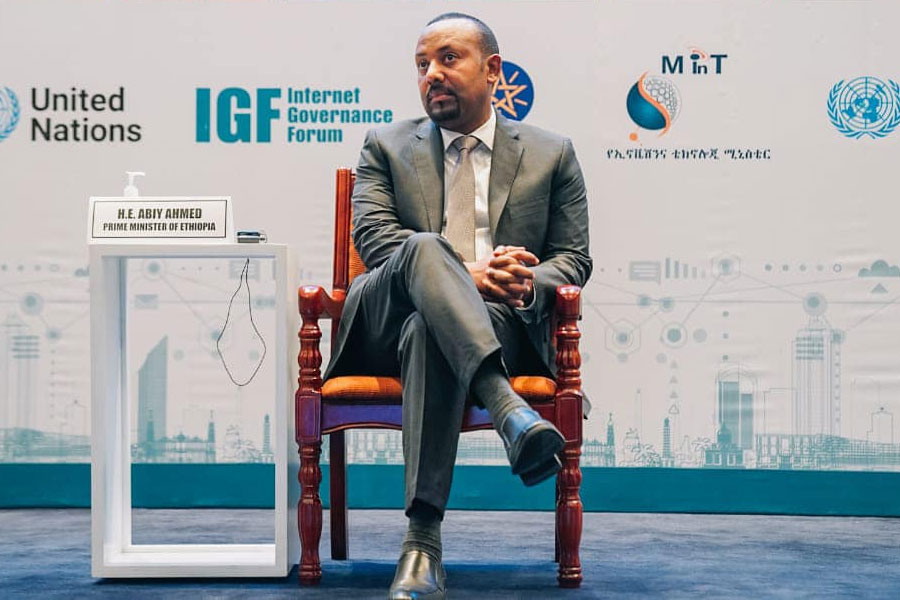
Viewpoints | Jan 18,2019
Jan 23 , 2021
By Stephen S. Roach
Plenty has been said, and rightfully so, about the violent insurrection at the US Capitol on January 6, 2021. Politicians are grappling with issues of legal and moral accountability. But the horrific events also touch on a critical contradiction of modern societies: the internet’s role as an instrument of democracy’s destruction.
It was not supposed to be this way. The internet’s open architecture has long been extolled by cyber-libertarian futurists as a powerful new democratising force. Information is free and available instantaneously – and anyone can now vote with a mere click.
The rapid expansion of the public square is offered as exhibit A. Internet penetration went from 1pc to 87pc of the US population from 1990 to 2018, far outstripping the surge in the world as a whole from zero to 51% over the same period. The United States, the world’s oldest democracy, led the charge in embracing new technologies of empowerment.
The problem, of course, lies in internet governance – namely, the absence of rules. Even as we extol the virtues of the digital world, to say nothing of the acceleration of digitization during the COVID-19 pandemic, the dark side has become impossible to ignore. The Western model of open-ended connectivity has given rise to platforms for trade in illicit drugs, pornography and pedophilia. It has also fueled political extremism, social polarisation, and now attempted insurrection. The virtues of cyber-libertarianism have become inseparable from its vices.
The Chinese model provides a stark contrast. Its censorship-intensive approach to internet governance is anathema to free societies. The state (or the Communist Party) not only restricts public discourse but favors surveillance over privacy. For China, governance is all about social, economic and ultimately political stability. As a self-proclaimed bastion of democracy, the US obviously does not see it that way. Censorship of any sort is viewed with abject scorn.
Yet scorn is a good way – to put it mildly – to describe most Americans’ reaction to the deadly assault on the US Capitol. Internet-enabled social and political mobilisation – first evident in Iran’s 2009 Green Movement and then in the Arab Spring of 2011 – has now struck at the heart of America.
Obviously, there is a major difference: Protesting citizens in authoritarian Iran and Arab countries were on the outside looking in, yearning for democracy. In the US, the attack on the citadel of democracy came from within, sparked by the President himself. This raises important questions about America’s own stability imperatives – and the failures of internet governance in revealing them.
US digital platforms – from Twitter and Facebook to Apple and Google – have taken matters into their own hands. Breaching a once sacrosanct line, they have banned the insurrectionist-in-chief, Donald Trump. Yet this one-off reaction is hardly a substitute for governance. Understandably, there are great misgivings about entrusting corporate leaders with the fundamental task of protecting democracy.
But that is not the only line that has been crossed in the US. As Shoshanna Zuboff shows in "The Age of Surveillance Capitalism," the business models of Google, Amazon and Facebook are based on the use of digital technology to gather and monetise personal data. This blurs the distinction between cyber-libertarianism and Chinese-style surveillance, and it highlights the essence of the privacy issue – proprietary ownership of personal data.
The COVID-19 crisis offers yet another perspective on surveillance and privacy. Here, too, China and the US bookend the debate. China’s response to the first sign of outbreaks – including the current one in Hebei province – stresses aggressive lockdowns, mandatory testing and masking, and QR-code app-based contact tracing. In the US, these are all matters of contentious political debate, viewed by many as unacceptable transgressions in a free and open society.
At one level, China’s results speak for themselves. There have been only minor outbreaks following the initial surge in Wuhan. Unfortunately, America’s second wave – far worse than the initial carnage in the spring of 2020 – also speaks for itself.
Yet, as a recent Pew Research survey indicates, fully 40-50pc of the American public still resist the discipline of science-based practices such as mobile contact tracing and engagement with public health officials. Couple that with significant opposition to vaccines and there is reason to believe that core tenets of democratic freedom are being twisted into an excuse to ignore the perils of COVID-19.
Whether or not we want to admit it, the aspirations and values of the so-called originalist interpretation of American democracy are being challenged as never before. The insurrection of January 6 and the pandemic share one critical implication: the potential breakdown of order in a free society. It is not that China has it right. It is that we may have it wrong. Unfortunately, today’s hyper-polarisation makes it exceedingly difficult to find a middle ground.
Barack Obama cautioned in his final speech as president that, “Our democracy is threatened whenever we take it for granted.”
Yet is not that exactly what America has been doing?
In a decade punctuated by the global financial crisis, the COVID-19 crisis, a racial justice crisis, an inequality crisis, and now a political crisis, we have only paid lip service to lofty democratic ideals.
Sadly, this complacency has come at a time of growing fragility for the American experiment. Internet-enabled connectivity is dangerously amplifying an increasingly polarized national discourse in an era of mounting social and political instability. The resulting vulnerability was brought into painfully sharp focus on January 6. The stewardship of democracy is at grave risk.
PUBLISHED ON
Jan 23,2021 [ VOL
21 , NO
1082]


Viewpoints | Jan 18,2019

View From Arada | Jun 25,2022

Commentaries | Nov 26,2022

Fortune News | Mar 26,2022

Radar | Dec 04,2022

Viewpoints | May 31,2025

My Opinion | Nov 07,2020

Viewpoints | Jan 18,2020

Radar | Feb 08,2020

My Opinion | Oct 05,2019

My Opinion | 131499 Views | Aug 14,2021

My Opinion | 127855 Views | Aug 21,2021

My Opinion | 125833 Views | Sep 10,2021

My Opinion | 123463 Views | Aug 07,2021

Dec 22 , 2024 . By TIZITA SHEWAFERAW
Charged with transforming colossal state-owned enterprises into modern and competitiv...

Aug 18 , 2024 . By AKSAH ITALO
Although predictable Yonas Zerihun's job in the ride-hailing service is not immune to...

Jul 28 , 2024 . By TIZITA SHEWAFERAW
Unhabitual, perhaps too many, Samuel Gebreyohannes, 38, used to occasionally enjoy a couple of beers at breakfast. However, he recently swit...

Jul 13 , 2024 . By AKSAH ITALO
Investors who rely on tractors, trucks, and field vehicles for commuting, transporting commodities, and f...

Jun 28 , 2025
Meseret Damtie, the assertive auditor general, has never been shy about naming names...

Jun 21 , 2025
A well-worn adage says, “Budget is not destiny, but it is direction.” Examining t...

Jun 14 , 2025
Yet again, the Horn of Africa is bracing for trouble. A region already frayed by wars...

Jun 7 , 2025
Few promises shine brighter in Addis Abeba than the pledge of a roof for every family...

Jun 29 , 2025
Addis Abeba's first rains have coincided with a sweeping rise in private school tuition, prompting the city's education...

Jun 29 , 2025 . By BEZAWIT HULUAGER
Central Bank Governor Mamo Mihretu claimed a bold reconfiguration of monetary policy...

Jun 29 , 2025 . By BEZAWIT HULUAGER
The federal government is betting on a sweeping overhaul of the driver licensing regi...

Jun 29 , 2025 . By NAHOM AYELE
Gadaa Bank has listed 1.2 million shares on the Ethiopian Securities Exchange (ESX),...